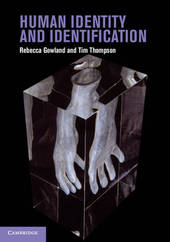
|
Human Identity and Identification
Paperback / softback
Main Details
| Title |
Human Identity and Identification
|
| Authors and Contributors |
By (author) Rebecca Gowland
|
|
By (author) Tim Thompson
|
| Physical Properties |
| Format:Paperback / softback | | Pages:233 | | Dimensions(mm): Height 245,Width 173 |
|
| Category/Genre | Genetics (non-medical)
Human biology |
|---|
| ISBN/Barcode |
9780521713665
|
| Classifications | Dewey:306 |
|---|
| Audience | | Postgraduate, Research & Scholarly | |
|---|
| Illustrations |
4 Tables, black and white; 9 Halftones, unspecified
|
|
Publishing Details |
| Publisher |
Cambridge University Press
|
| Imprint |
Cambridge University Press
|
| Publication Date |
17 January 2013 |
| Publication Country |
United Kingdom
|
Description
Few things are as interesting to us as our own bodies and, by extension, our own identities. In recent years, there has been a growing interest in the relationship between the body, environment and society. Reflecting upon these developments, this book examines the role of the body in human identification, in the forging of identities, and the ways in which it embodies our social worlds. The approach is integrative, taking a uniquely biological perspective and reflecting on current discourse in the social sciences. With particular reference to bioarchaeology and forensic science, the authors focus on the construction and categorisation of the body within scientific and popular discourse, examining its many tissues, from the outermost to the innermost, from the skin to DNA. Synthesising two, traditionally disparate, strands of research, this is a valuable contribution to research on human identification and the embodiment of identity.
Author Biography
Rebecca Gowland is a Lecturer in Human Bioarchaeology in the Department of Archaeology at Durham University. Her current research interests lie in health and demography of the past, skeletal ageing and age as an aspect of social identity, social perceptions, care and treatment of the physically impaired in the past, and the interrelationship between the physical body and social identity. Tim Thompson is a Reader in Biological and Forensic Anthropology at Teesside University, where he also acts as a consultant forensic anthropologist. Most of his research examines the effects of burning on the skeleton and how this can help interpret the context of death. He is also interested in the relationship between identity and identification, modification of the body in the modern context, and the role of forensic anthropology in the world at large.
|